The science of Happier Cycles
Apart from the fact that we have periods, few of us will have grown up with the knowledge of how the menstrual cycle actually works and how important each phase is to our overall health and well being! Here are just a few tips on how to optimise your current cycle phase, but this is only one piece of the period health puzzle…
Keep your eyes on your inbox in the coming weeks as we’ll be moving through your cycle with you and sharing advice from our holistic menstrual health handbook.
Your Current Phase:
Menstruation
Winter
What's happening?
What’s happening? It sounds like you’re currently in your Menstruation phase - so you’re either on your period as we speak, or it’s just ending.
Timescale:
Typically 3-7 days.
Symptoms:
Cramping, bleeding, bloating, and fatigue.
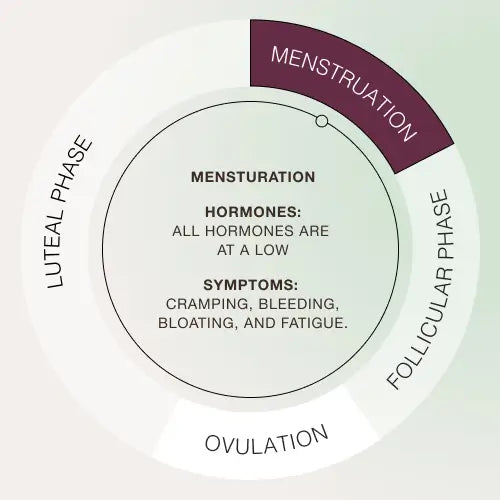
So what’s going on biologically right now?
Well, obviously, the biggest thing that’s going on for you physically, is that your womb is shedding its lining - or endometrium.
Everyone’s flow is unique, but generally speaking, we would expect a healthy period to last between 3 and 6 days and the average person releases around 30-50 millilitres of blood, so around 6-10 tampons worth.
Well, in terms of your hormones, your Oestrogen and progesterone levels are pretty low, as they dip right at the end of your cycle to trigger the start of your bleed. As your period progresses y
our Oestrogen levels will begin to slowly rise (and this means your mood usually will improve too!)
Did you know…. How you treat your body throughout the rest of your cycle can impact how intense your period symptoms are!
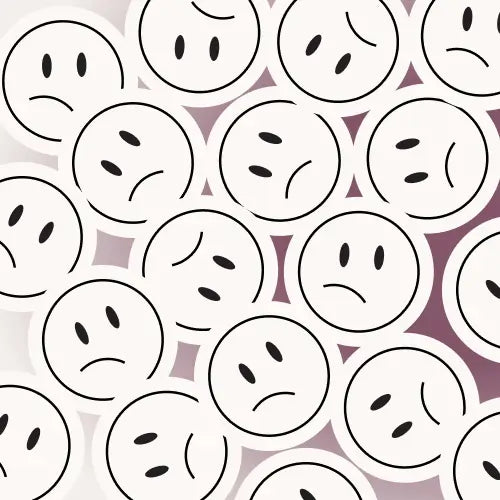
For the first couple of days of your bleed, it’s not uncommon to feel pretty fatigued - your body is busy doing something pretty incredible after all.
You might also suffer from pain and cramping - and whilst a little discomfort is normal during your winter phase, if you are in agony, or it’s impacting your life, definitely go and see a doctor, as it’s probably a sign that something isn't right.
The good news is that, if you struggle with low mood in your luteal phase (so if your PMS is pretty intense!) you might find yourself feeling a lot better once your period arrives and your Oestrogen levels start to rise.
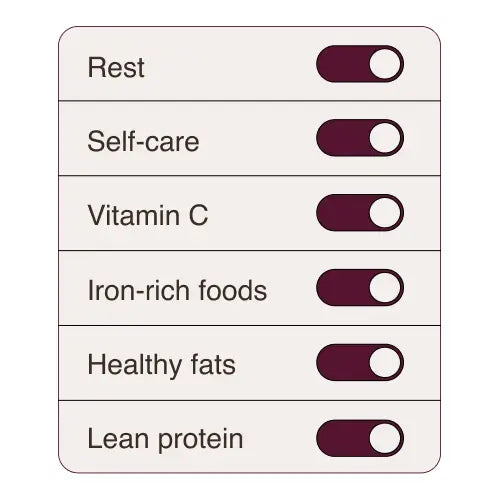
Movement
Rest is pretty key when it comes to your Menstruation phase - but that doesn’t mean you have to stay at home wrapped in a blanket the whole time.
Moving your body is a great way to relieve period pain and tackle fatigue - so try to engage in some low-impact exercises like walking or yoga.
Nutrition
Whilst your energy levels might be low, your body is very busy making your period happen - so when it comes to nutrition, support your energy stores with lots of lean protein and healthy fats!
As you’re bleeding, you might also be losing iron, so try to replenish it with iron-rich foods like red meat, lentils and beans and dark leafy greens such as spinach and kale. It’s also important to ensure your Vitamin C levels are topped up - as Vit C can help with the absorbance of iron - so go to town on that fresh orange juice.
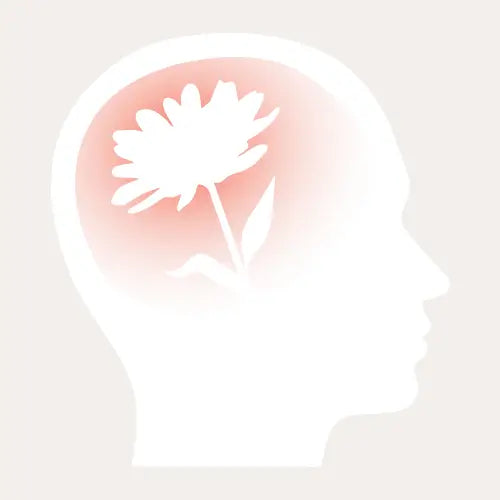
There’s a reason that Menstruation is known as Winter - and that’s because it’s the perfect time to hibernate. You may feel a little withdrawn or sensitive during this time, and that’s ok! Feel no shame in cancelling those plans and enjoying some alone time. Make self-care a priority and try to keep things slow and simple, so you don’t feel overwhelmed.
The Science of Your Cycle

So what’s going on biologically right now?
Well, obviously, the biggest thing that’s going on for you physically, is that your womb is shedding its lining - or endometrium.
Everyone’s flow is unique, but generally speaking, we would expect a healthy period to last between 3 and 6 days and the average person releases around 30-50 millilitres of blood, so around 6-10 tampons worth.
Well, in terms of your hormones, your Oestrogen and progesterone levels are pretty low, as they dip right at the end of your cycle to trigger the start of your bleed. As your period progresses y
our Oestrogen levels will begin to slowly rise (and this means your mood usually will improve too!)
Did you know…. How you treat your body throughout the rest of your cycle can impact how intense your period symptoms are!
How you might be feeling

For the first couple of days of your bleed, it’s not uncommon to feel pretty fatigued - your body is busy doing something pretty incredible after all.
You might also suffer from pain and cramping - and whilst a little discomfort is normal during your winter phase, if you are in agony, or it’s impacting your life, definitely go and see a doctor, as it’s probably a sign that something isn't right.
The good news is that, if you struggle with low mood in your luteal phase (so if your PMS is pretty intense!) you might find yourself feeling a lot better once your period arrives and your Oestrogen levels start to rise.
How to nourish your body

Movement
Rest is pretty key when it comes to your Menstruation phase - but that doesn’t mean you have to stay at home wrapped in a blanket the whole time.
Moving your body is a great way to relieve period pain and tackle fatigue - so try to engage in some low-impact exercises like walking or yoga.
Nutrition
Whilst your energy levels might be low, your body is very busy making your period happen - so when it comes to nutrition, support your energy stores with lots of lean protein and healthy fats!
As you’re bleeding, you might also be losing iron, so try to replenish it with iron-rich foods like red meat, lentils and beans and dark leafy greens such as spinach and kale. It’s also important to ensure your Vitamin C levels are topped up - as Vit C can help with the absorbance of iron - so go to town on that fresh orange juice.
How to nourish your mind

There’s a reason that Menstruation is known as Winter - and that’s because it’s the perfect time to hibernate. You may feel a little withdrawn or sensitive during this time, and that’s ok! Feel no shame in cancelling those plans and enjoying some alone time. Make self-care a priority and try to keep things slow and simple, so you don’t feel overwhelmed.
The science of Happier Cycles
Apart from the fact that we have periods, few of us will have grown up with the knowledge of how the menstrual cycle actually works and how important each phase is to our overall health and well being! Here are just a few tips on how to optimise your current cycle phase, but this is only one piece of the period health puzzle…
Keep your eyes on your inbox in the coming weeks as we’ll be moving through your cycle with you and sharing advice from our holistic menstrual health handbook.
Your Current Phase:
Follicular
Spring
What's happening?
It sounds like you’re currently in your Follicular phase - the sweet spot between your period and ovulation! The body prepares for ovulation.
Timescale:
Typically 7-14 days.
Symptoms:
Increased energy and sense of renewal.
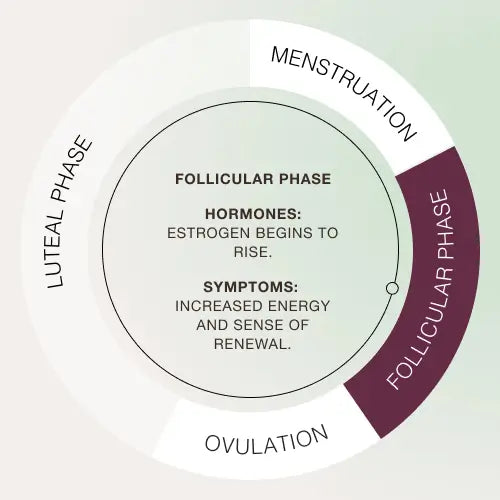
So what’s going on in your body right now?
During this phase, your ovaries are growing follicles that will eventually mature into an egg - which will be released during ovulation.
The hormones involved in maturing your eggs are pretty incredible. From your brain, your pituitary gland releases Follicle Stimulating Hormone (FSH) which tells the follicle to grow. As the follicle matures it will start to produce oestrogen as it gets bigger - peaking just before ovulation. Oestrogen is kind of like the Beyoncé of the hormone world - which is why many people find that they feel their best during their follicular phase!
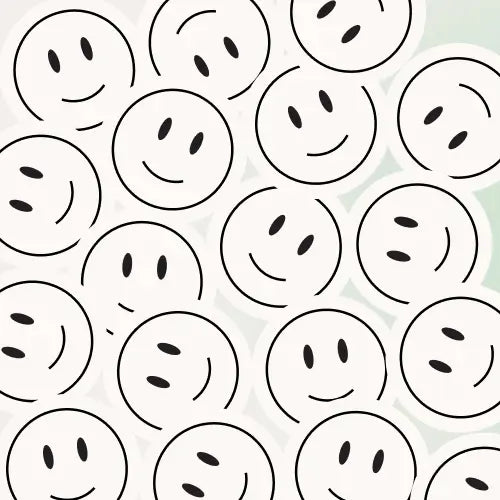
Oestrogen brings with it a whole lot of confidence and energy as well as an uptick in serotonin! You might find yourself feeling super sociable and eager to try new things - and generally quite happy to go with the flow.
At a primal level, our follicular phase is when we would be out there looking to attract a mate, ready for our fertile window to hit! Whether you’re single or in a relationship, you might notice that you feel a bit more flirtatious than usual...
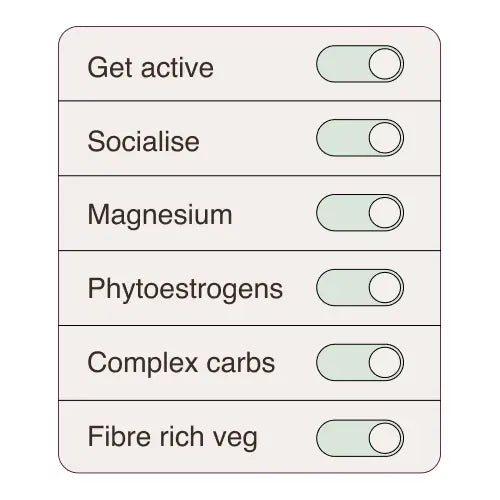
Movement
With increased energy levels, your Spring phase is a great time to get active and try new things! Now is a good opportunity to sign up for that HIIT class you’ve been thinking of joining or combine exercise with socialising by going hiking with friends.
But be careful… Studies have shown that muscle and tendon injuries occur almost twice as often in the late follicular phase (around day 7 to day 15) compared to the early follicular or luteal phase, probably because oestrogen can make our tendons more lax.
Nutrition
Things can feel pretty great in your follicular phase, but how you nurture your body now can have a massive impact on your symptoms in the latter half of your cycle and during your period.
Excessive oestrogen is one of the triggers for symptoms like period pain and PMS. When oestrogen levels are peaking during our follicular phase, it’s important that we fuel up on phytoestrogens - foods that can help reduce the effectiveness of the hormone. Foods rich in phytoestrogen s include flax seeds, tofu, sesame seeds and dried fruits.
Magnesium can also help to metabolise oestrogen - and our levels of magnesium tend to be their lowest during our follicular phase. Stock up on magensium-rich foods like dark leafy greens and beans - and grab a great supplement to help boost your levels!

Generally speaking, people find that their mental wellbeing is pretty good during their follicular phase and the urge to socialise can sometimes mean we start burning the candle at both ends. Remember that burn-out may catch up with you later in your cycle - so don’t forget to make time for rest amongst the fun.
You might find that you are bursting with ideas during this time - so make the most of this and get creative! Vision boarding is a great way to capture all of that optimistic energy and start looking ahead to the future.
The Science of Your Cycle

So what’s going on in your body right now?
During this phase, your ovaries are growing follicles that will eventually mature into an egg - which will be released during ovulation.
The hormones involved in maturing your eggs are pretty incredible. From your brain, your pituitary gland releases Follicle Stimulating Hormone (FSH) which tells the follicle to grow. As the follicle matures it will start to produce oestrogen as it gets bigger - peaking just before ovulation. Oestrogen is kind of like the Beyoncé of the hormone world - which is why many people find that they feel their best during their follicular phase!
How you might be feeling

Oestrogen brings with it a whole lot of confidence and energy as well as an uptick in serotonin! You might find yourself feeling super sociable and eager to try new things - and generally quite happy to go with the flow.
At a primal level, our follicular phase is when we would be out there looking to attract a mate, ready for our fertile window to hit! Whether you’re single or in a relationship, you might notice that you feel a bit more flirtatious than usual...
How to nourish your body

Movement
With increased energy levels, your Spring phase is a great time to get active and try new things! Now is a good opportunity to sign up for that HIIT class you’ve been thinking of joining or combine exercise with socialising by going hiking with friends.
But be careful… Studies have shown that muscle and tendon injuries occur almost twice as often in the late follicular phase (around day 7 to day 15) compared to the early follicular or luteal phase, probably because oestrogen can make our tendons more lax.
Nutrition
Things can feel pretty great in your follicular phase, but how you nurture your body now can have a massive impact on your symptoms in the latter half of your cycle and during your period.
Excessive oestrogen is one of the triggers for symptoms like period pain and PMS. When oestrogen levels are peaking during our follicular phase, it’s important that we fuel up on phytoestrogens - foods that can help reduce the effectiveness of the hormone. Foods rich in phytoestrogen s include flax seeds, tofu, sesame seeds and dried fruits.
Magnesium can also help to metabolise oestrogen - and our levels of magnesium tend to be their lowest during our follicular phase. Stock up on magensium-rich foods like dark leafy greens and beans - and grab a great supplement to help boost your levels!
How to nourish your mind

Generally speaking, people find that their mental wellbeing is pretty good during their follicular phase and the urge to socialise can sometimes mean we start burning the candle at both ends. Remember that burn-out may catch up with you later in your cycle - so don’t forget to make time for rest amongst the fun.
You might find that you are bursting with ideas during this time - so make the most of this and get creative! Vision boarding is a great way to capture all of that optimistic energy and start looking ahead to the future.
The science of Happier Cycles
Apart from the fact that we have periods, few of us will have grown up with the knowledge of how the menstrual cycle actually works and how important each phase is to our overall health and well being! Here are just a few tips on how to optimise your current cycle phase, but this is only one piece of the period health puzzle…
Keep your eyes on your inbox in the coming weeks as we’ll be moving through your cycle with you and sharing advice from our holistic menstrual health handbook.
Your Current Phase:
Ovulation
Summer
What's happening?
It sounds like you may be close to ovulating! Ovulation usually arrives at the midpoint of your cycle - but this can vary from person to person. If you struggle with irregular periods, it’s likely because you are ovulating early or late - or in some cases not at all.
Timescale:
Typically 10-14 days.
Symptoms:
Increased cervical mucus and a higher sex drive.
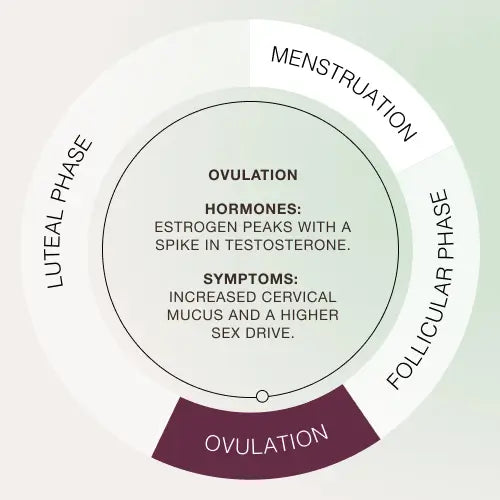
So what’s going on in your body right now?
Oestrogen levels will be at their peak right before ovulation, as the follicle reaches its final maturity. When the egg is ready, the body releases a surge of luteinizing hormone (LH) which will trigger the release of the egg down the fallopian tube - this is the process of ovulation!
The days leading up to - and the day of - ovulation are the days you are most likely to get pregnant and there are lots of physical signs that you’re in your fertile window! Your cervical mucus usually becomes thinner and wetter and your cervix becomes softer and higher all to help the sperm travel up to the egg.
As soon as ovulation happens you will notice a spike in your body temperature - which is why you can confirm ovulation if you are tracking your Basal Body Temperature daily.
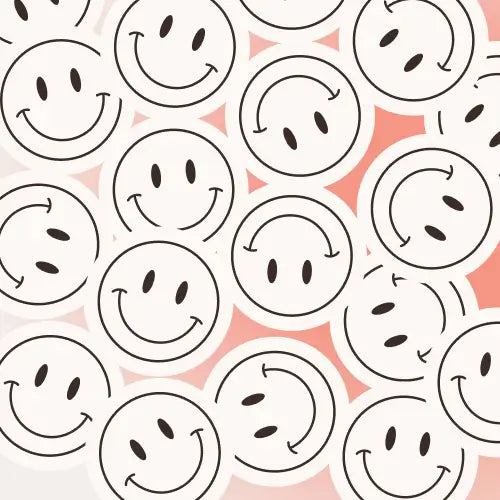
As this is your most fertile window, it’s unsurprising that your libido will likely be at its peak! Aside from feeling pretty sexy, you might also notice a boost in your confidence and communication skills - ovulation is a great time to take on that big work presentation.
However, ovulation can be a phase of two halves. As our oestrogen peaks, some people struggle with painful symptoms like breast tenderness or ovulation cramping. You might also find that as soon as your egg is released you feel a plummet in oestrogen and a rise in progesterone, which can make you feel very fatigued and more sensitive.
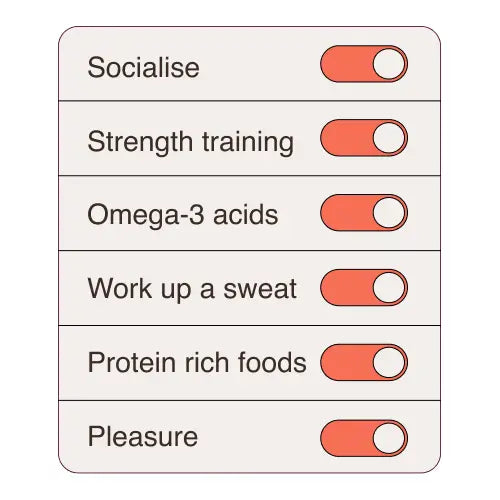
Movement
Studies indicate that around ovulation we get a surge in our testosterone levels. This is part of the reason your sex drive might increase around that time - but it’s also a great opportunity to channel your hormonal rush into your workouts! Testosterone helps our muscles repair faster and stronger - so why not make more time for strength training and push yourself with weights or kettlebells.
Food
Our oestrogen levels reach their peak during this phase and excess oestrogen can have some negative side effects - including breast tenderness and skin issues. Now is a great time to include foods that help the liver process oestrogen - like kale, broccoli, garlic, radishes and onions.
It’s always a good idea to eat a diet full of Omega-3 fatty acids, but around ovulation, it’s even more important, especially if you are hoping to get pregnant as studies indicate they could help with egg implantation. Even if babies aren’t on your mind right now, Omega-3s have lots of other benefits including improving our skin and our brain function!

Ovulation is the perfect time to delve into pleasure - with yourself or with a partner - so explore those fantasies and try new things! If you are trying to conceive, there can often be a lot of stress and urgency around ovulation - so try to go easy on yourself and have fun along the way.
Also, remember that the ovulation phase is a transition - we’re going from the happy high-energy vibes of the follicular phase to the more sensitive and introverted luteal phase. Don’t push yourself too hard and ensure you’re getting enough rest so that you don’t burn out post ovulation.
The Science of Your Cycle

So what’s going on in your body right now?
Oestrogen levels will be at their peak right before ovulation, as the follicle reaches its final maturity. When the egg is ready, the body releases a surge of luteinizing hormone (LH) which will trigger the release of the egg down the fallopian tube - this is the process of ovulation!
The days leading up to - and the day of - ovulation are the days you are most likely to get pregnant and there are lots of physical signs that you’re in your fertile window! Your cervical mucus usually becomes thinner and wetter and your cervix becomes softer and higher all to help the sperm travel up to the egg.
As soon as ovulation happens you will notice a spike in your body temperature - which is why you can confirm ovulation if you are tracking your Basal Body Temperature daily.
How you might be feeling

As this is your most fertile window, it’s unsurprising that your libido will likely be at its peak! Aside from feeling pretty sexy, you might also notice a boost in your confidence and communication skills - ovulation is a great time to take on that big work presentation.
However, ovulation can be a phase of two halves. As our oestrogen peaks, some people struggle with painful symptoms like breast tenderness or ovulation cramping. You might also find that as soon as your egg is released you feel a plummet in oestrogen and a rise in progesterone, which can make you feel very fatigued and more sensitive.
How to nourish your body

Movement
Studies indicate that around ovulation we get a surge in our testosterone levels. This is part of the reason your sex drive might increase around that time - but it’s also a great opportunity to channel your hormonal rush into your workouts! Testosterone helps our muscles repair faster and stronger - so why not make more time for strength training and push yourself with weights or kettlebells.
Food
Our oestrogen levels reach their peak during this phase and excess oestrogen can have some negative side effects - including breast tenderness and skin issues. Now is a great time to include foods that help the liver process oestrogen - like kale, broccoli, garlic, radishes and onions.
It’s always a good idea to eat a diet full of Omega-3 fatty acids, but around ovulation, it’s even more important, especially if you are hoping to get pregnant as studies indicate they could help with egg implantation. Even if babies aren’t on your mind right now, Omega-3s have lots of other benefits including improving our skin and our brain function!
How to nourish your mind

Ovulation is the perfect time to delve into pleasure - with yourself or with a partner - so explore those fantasies and try new things! If you are trying to conceive, there can often be a lot of stress and urgency around ovulation - so try to go easy on yourself and have fun along the way.
Also, remember that the ovulation phase is a transition - we’re going from the happy high-energy vibes of the follicular phase to the more sensitive and introverted luteal phase. Don’t push yourself too hard and ensure you’re getting enough rest so that you don’t burn out post ovulation.
The science of Happier Cycles
Apart from the fact that we have periods, few of us will have grown up with the knowledge of how the menstrual cycle actually works and how important each phase is to our overall health and well being! Here are just a few tips on how to optimise your current cycle phase, but this is only one piece of the period health puzzle…
Keep your eyes on your inbox in the coming weeks as we’ll be moving through your cycle with you and sharing advice from our holistic menstrual health handbook.
Your Current Phase:
Luteal
Autumn
What's happening?
It sounds like you might be in your luteal phase right now! The time between ovulation and your next period is known as your luteal phase - or Autumn - but you may know it as your pre-menstrual time.
Timescale:
Typically occurs around day 14 of the cycle.
Symptoms:
Mood swings, bloating, and breast tenderness.
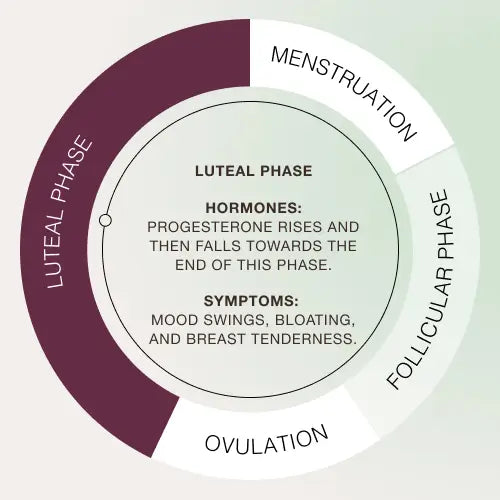
So what’s going on in your body right now?
After ovulation, your body essentially thinks you could be pregnant. The newly released egg (now known as the corpus luteum) will start to produce the hormone progesterone - and the main job of progesterone is to support early pregnancy.
After a week or so the egg and the follicle will break down - signalling to the body that there is no baby and that the womb lining is not needed aka it’s time for your period.
Once the egg breaks down your progesterone and oestrogen levels will take a dip. This is what triggers your next bleed and can also cause PMS symptoms if the dip is too dramatic.
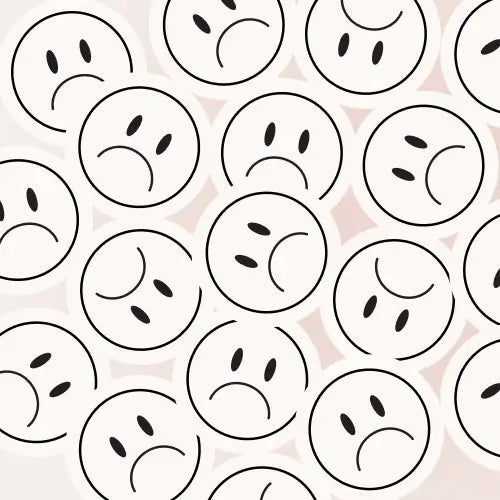
In your luteal phase, progesterone is the dominant hormone. If Oestrogen is the Beyonce of the hormone world, progesterone is more of a Billie Eilish. Introverted, yet straight talking and slightly lower energy. After all, progesterone is hanging around hoping for a pregnancy, so it wants you to stay at home, be safe and avoid risks!
We deal with a few hormonal ups and downs during our luteal phase - the initial drop of oestrogen after ovulation and then the drop of both progesterone and oestrogen before our period arrives.
These hormonal fluctuations can trigger mood swings and PMS symptoms like bloating or skin breakouts - and if you’re a little more sensitive than usual, that’s ok. However, extreme drops in mood or feelings of anxiety or depression could be a sign of a hormonal imbalance or PMDD (Premenstrual dysphoric disorder) - and is worth talking to a doctor about.
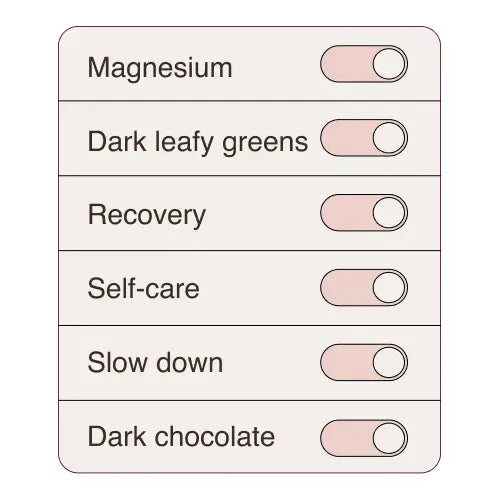
Movement
Exercise can definitely be really helpful during your luteal phase - it can boost your mood, relieve bloating and even help with PMS cramping, but remember to listen to your body - if you’re not feeling super energetic, don’t push yourself!
Around this time of your cycle, your body temperature naturally rises. You probably won’t notice it but it can mean you get hotter a lot faster when doing intense cardio - and this can make you feel exhausted faster too. You can definitely still do the exercise you love around this time, but just be aware that if your performance dips slightly, it’s likely down to your lower energy levels rather than your abilities!
Nutrition
We tend to be more hungry in our luteal phase and with good reason - our bodies are pretty busy!
Whilst you may get cravings for sugary or fried foods, try to keep things balanced as these foods can trigger inflammation which could make period pain more intense once your bleed arrives.
A healthy diet rich in whole foods, specifically packed with vitamins B6, B12, D, and C and magnesium can help to manage PMS symptoms of irritability, anxiety and fatigue by keeping your hormones smooth and balanced. Reach for foods like dark leafy green, complex carbohydrates and oily fish like salmon - and if you do have sweet cravings dark chocolate is full of magnesium!
When it comes to drinking, if you find that alcohol impacts your mood (it is a depressant after all) it might be a good idea to swap your wine for a kombucha during this time. - so that’s plenty of fruit and vegetables as well as foods rich in omega-3 fatty acids, such as salmon.

If you are struggling with low mood in the lead-up to your period, be sure to do everything you can to support your mental well-being. Take it easy but be sure to make time for things that make you feel good - whether that’s catching up with a friend, reading your favourite book or simply cleaning the house so you can enjoy a calming environment.
In this phase of our cycle, we don’t tend to deal with overwhelm well - how can you slow the pace of life down? Are there things you can say no to or tasks you can ask for help with?
The Science of Your Cycle

So what’s going on in your body right now?
After ovulation, your body essentially thinks you could be pregnant. The newly released egg (now known as the corpus luteum) will start to produce the hormone progesterone - and the main job of progesterone is to support early pregnancy.
After a week or so the egg and the follicle will break down - signalling to the body that there is no baby and that the womb lining is not needed aka it’s time for your period.
Once the egg breaks down your progesterone and oestrogen levels will take a dip. This is what triggers your next bleed and can also cause PMS symptoms if the dip is too dramatic.
How you might be feeling

In your luteal phase, progesterone is the dominant hormone. If Oestrogen is the Beyonce of the hormone world, progesterone is more of a Billie Eilish. Introverted, yet straight talking and slightly lower energy. After all, progesterone is hanging around hoping for a pregnancy, so it wants you to stay at home, be safe and avoid risks!
We deal with a few hormonal ups and downs during our luteal phase - the initial drop of oestrogen after ovulation and then the drop of both progesterone and oestrogen before our period arrives.
These hormonal fluctuations can trigger mood swings and PMS symptoms like bloating or skin breakouts - and if you’re a little more sensitive than usual, that’s ok. However, extreme drops in mood or feelings of anxiety or depression could be a sign of a hormonal imbalance or PMDD (Premenstrual dysphoric disorder) - and is worth talking to a doctor about.
How to nourish your body

Movement
Exercise can definitely be really helpful during your luteal phase - it can boost your mood, relieve bloating and even help with PMS cramping, but remember to listen to your body - if you’re not feeling super energetic, don’t push yourself!
Around this time of your cycle, your body temperature naturally rises. You probably won’t notice it but it can mean you get hotter a lot faster when doing intense cardio - and this can make you feel exhausted faster too. You can definitely still do the exercise you love around this time, but just be aware that if your performance dips slightly, it’s likely down to your lower energy levels rather than your abilities!
Nutrition
We tend to be more hungry in our luteal phase and with good reason - our bodies are pretty busy!
Whilst you may get cravings for sugary or fried foods, try to keep things balanced as these foods can trigger inflammation which could make period pain more intense once your bleed arrives.
A healthy diet rich in whole foods, specifically packed with vitamins B6, B12, D, and C and magnesium can help to manage PMS symptoms of irritability, anxiety and fatigue by keeping your hormones smooth and balanced. Reach for foods like dark leafy green, complex carbohydrates and oily fish like salmon - and if you do have sweet cravings dark chocolate is full of magnesium!
When it comes to drinking, if you find that alcohol impacts your mood (it is a depressant after all) it might be a good idea to swap your wine for a kombucha during this time. - so that’s plenty of fruit and vegetables as well as foods rich in omega-3 fatty acids, such as salmon.
How to nourish your mind

If you are struggling with low mood in the lead-up to your period, be sure to do everything you can to support your mental well-being. Take it easy but be sure to make time for things that make you feel good - whether that’s catching up with a friend, reading your favourite book or simply cleaning the house so you can enjoy a calming environment.
In this phase of our cycle, we don’t tend to deal with overwhelm well - how can you slow the pace of life down? Are there things you can say no to or tasks you can ask for help with?
The science of Happier Cycles
Apart from the fact that we have periods, few of us will have grown up with the knowledge of how the menstrual cycle actually works and how important each phase is to our overall health and well being!
The advice from our holistic menstrual health handbook will still be really valuable to you, wherever you’re at in your cycle - and some of the diet and lifestyle tips may even help you achieve more hormonal balance and get your flow in a better rhythm.
Your Current Phase:
Inconclusive
Based on your answers it’s really hard for us to pinpoint where you are in your cycle right now - and we’re definitely not going to make something up just to make our quiz look good!
Your cycle phase may not be clear because you are on hormonal contraception, or perhaps you have irregular periods.
If you are living with an irregular cycle, you are not alone, menstrual irregularities pop up in around 25% of people with periods.
Let’s start with the start of your cycle - your period.
Menstruation AKA Winter
The first day of your period is classed as Day 1 of your menstrual cycle - so it seems like a pretty good place to start when learning about your phases. When thinking about your cycle as seasons, menstruation is usually described as ‘Winter’ - a time for rest and hibernation (sounds good to us).

So what’s going on biologically right now?
Well, obviously, the biggest thing that’s going on for you physically, is that your womb is shedding its lining - or endometrium.
Everyone’s flow is unique, but generally speaking, we would expect a healthy period to last between 3 and 6 days and the average person releases around 30-50 millilitres of blood, so around 6-10 tampons worth.
Well, in terms of your hormones, your Oestrogen and progesterone levels are pretty low, as they dip right at the end of your cycle to trigger the start of your bleed. As your period progresses y
our Oestrogen levels will begin to slowly rise (and this means your mood usually will improve too!)
Did you know…. How you treat your body throughout the rest of your cycle can impact how intense your period symptoms are!

For the first couple of days of your bleed, it’s not uncommon to feel pretty fatigued - your body is busy doing something pretty incredible after all.
You might also suffer from pain and cramping - and whilst a little discomfort is normal during your winter phase, if you are in agony, or it’s impacting your life, definitely go and see a doctor, as it’s probably a sign that something isn't right.
The good news is that, if you struggle with low mood in your luteal phase (so if your PMS is pretty intense!) you might find yourself feeling a lot better once your period arrives and your Oestrogen levels start to rise.

Movement
Rest is pretty key when it comes to your Menstruation phase - but that doesn’t mean you have to stay at home wrapped in a blanket the whole time.
Moving your body is a great way to relieve period pain and tackle fatigue - so try to engage in some low-impact exercises like walking or yoga.
Nutrition
Whilst your energy levels might be low, your body is very busy making your period happen - so when it comes to nutrition, support your energy stores with lots of lean protein and healthy fats!
As you’re bleeding, you might also be losing iron, so try to replenish it with iron-rich foods like red meat, lentils and beans and dark leafy greens such as spinach and kale. It’s also important to ensure your Vitamin C levels are topped up - as Vit C can help with the absorbance of iron - so go to town on that fresh orange juice.

There’s a reason that Menstruation is known as Winter - and that’s because it’s the perfect time to hibernate. You may feel a little withdrawn or sensitive during this time, and that’s ok! Feel no shame in cancelling those plans and enjoying some alone time. Make self-care a priority and try to keep things slow and simple, so you don’t feel overwhelmed.
The Science of Your Cycle

So what’s going on biologically right now?
Well, obviously, the biggest thing that’s going on for you physically, is that your womb is shedding its lining - or endometrium.
Everyone’s flow is unique, but generally speaking, we would expect a healthy period to last between 3 and 6 days and the average person releases around 30-50 millilitres of blood, so around 6-10 tampons worth.
Well, in terms of your hormones, your Oestrogen and progesterone levels are pretty low, as they dip right at the end of your cycle to trigger the start of your bleed. As your period progresses y
our Oestrogen levels will begin to slowly rise (and this means your mood usually will improve too!)
Did you know…. How you treat your body throughout the rest of your cycle can impact how intense your period symptoms are!
How you might be feeling

For the first couple of days of your bleed, it’s not uncommon to feel pretty fatigued - your body is busy doing something pretty incredible after all.
You might also suffer from pain and cramping - and whilst a little discomfort is normal during your winter phase, if you are in agony, or it’s impacting your life, definitely go and see a doctor, as it’s probably a sign that something isn't right.
The good news is that, if you struggle with low mood in your luteal phase (so if your PMS is pretty intense!) you might find yourself feeling a lot better once your period arrives and your Oestrogen levels start to rise.
How to nourish your body

Movement
Rest is pretty key when it comes to your Menstruation phase - but that doesn’t mean you have to stay at home wrapped in a blanket the whole time.
Moving your body is a great way to relieve period pain and tackle fatigue - so try to engage in some low-impact exercises like walking or yoga.
Nutrition
Whilst your energy levels might be low, your body is very busy making your period happen - so when it comes to nutrition, support your energy stores with lots of lean protein and healthy fats!
As you’re bleeding, you might also be losing iron, so try to replenish it with iron-rich foods like red meat, lentils and beans and dark leafy greens such as spinach and kale. It’s also important to ensure your Vitamin C levels are topped up - as Vit C can help with the absorbance of iron - so go to town on that fresh orange juice.
How to nourish your mind

There’s a reason that Menstruation is known as Winter - and that’s because it’s the perfect time to hibernate. You may feel a little withdrawn or sensitive during this time, and that’s ok! Feel no shame in cancelling those plans and enjoying some alone time. Make self-care a priority and try to keep things slow and simple, so you don’t feel overwhelmed.